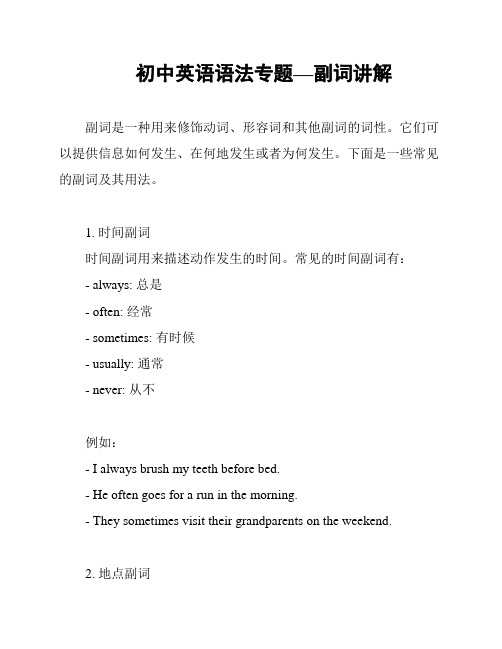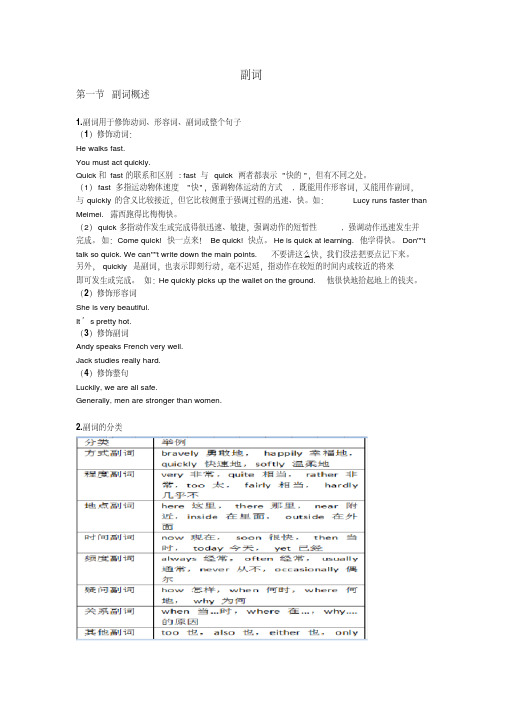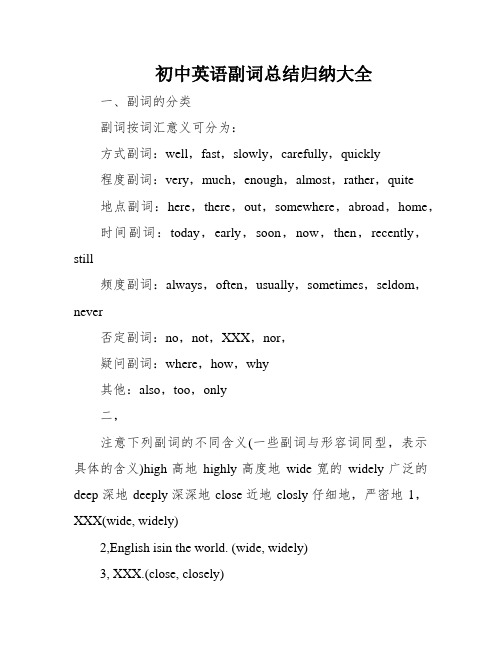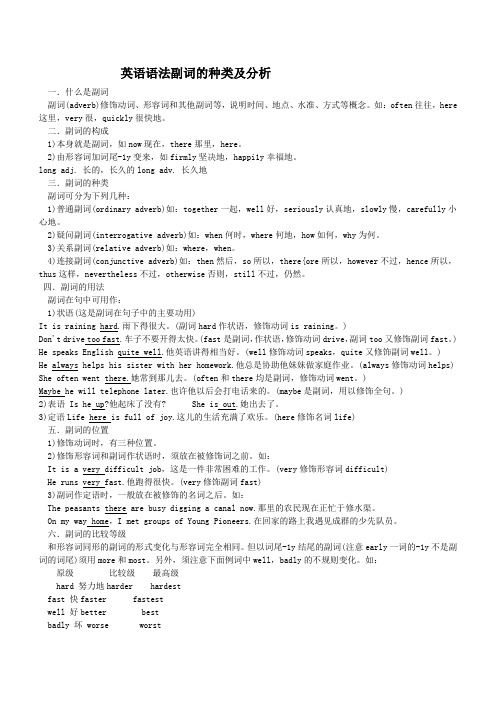初中英语语法专题副词
初中英语知识点总结:英语副词精华讲解

初中英语知识点总结:英语副词精华讲解一. 定义:副词主要用来修饰动词,形容词,副词或其他结构。
一般副词主要分为以下几种:①.时间副词, 如: often, always, early, now②.地点副词, 如: here, there, above, outside③.方式副词, 如: hard, well, badly, fast, slowly④.程度副词, 如: very, quite, much, still, almost2.疑问副词(放在特殊疑问句的句首), 如: how, when, where, why3.关系副词(放在定语从句句首), 如: when, where, why4.连接副词(放在名词从句句首), 如: how, when, where, why, whether二. 副词的位置:1) 在实义动词之前。
2) 在be动词、助动词之后。
3) 多个助动词时,副词一般放在第一个助动词后。
注意:a. 大多数方式副词位于句尾,但宾语过长,副词可以提前,以使句子平衡。
例如:We could see very clearly a strange light ahead of us.我们清楚地看到前面有奇怪的光。
b. 方式副词well,badly,hard等只放在句尾。
例如:He speaks English well. 他英语说得好。
三. 副词的排列顺序:1) 时间,地点副词,小单位的在前,大单位在后。
2) 方式副词,短的在前,长的在后,并用and或but等连词连接。
例如:Please write slowly and carefully. 请写得慢一些,仔细一些3) 多个不同副词排列:程度+地点+方式+时间副词。
注意:副词very 可以修饰形容词,但不能修饰动词。
改错:(错)I very like English.(对)I like English very much.注意:副词enough要放在形容词的后面,形容词enough放在名词前后都可。
初中英语语法知识精讲:常用副词考法归纳6

初中英语语法知识精讲:常用副词考法归纳6英语副词的分类(1) 时间副词:常见的有now, then, soon, ago, recently, lately, later, before, early, today, tomorrow, yesterday, tonight, suddenly, immediately, still, already, just等。
如:An idea suddenly struck me.我心中忽然产生一个念头。
(2) 地点副词:常见的有here, there, up, down, away, nearby, home, ahead, abroad, indoors, overseas, upstairs, downstairs 等。
如:I am considering going abroad.我正在考虑出国。
(3) 方式副词:表示行为方式的副词大多以-ly结尾,常见的有quietly, heavily, warmly, carefully, happily, politely, angrily等。
如:Look at the picture carefully.仔细看这幅画。
(4) 频度副词:常见的有always, usually, often, frequently, constantly, occasionally, sometimes, seldom, hardly, rarely, never等。
Sometimes he gets up early.他有时起得早。
(5) 程度副词:常见的有fairly, pretty, rather, quite, very, much, too, greatly, almost, nearly, half, highly, deeply, partly, perfectly, really等。
如:The film was quite good.这个电影不错。
初中英语语法专题—副词讲解

初中英语语法专题—副词讲解副词是一种用来修饰动词、形容词和其他副词的词性。
它们可以提供信息如何发生、在何地发生或者为何发生。
下面是一些常见的副词及其用法。
1. 时间副词时间副词用来描述动作发生的时间。
常见的时间副词有:- always: 总是- often: 经常- sometimes: 有时候- usually: 通常- never: 从不例如:- I always brush my teeth before bed.- He often goes for a run in the morning.- They sometimes visit their grandparents on the weekend.2. 地点副词地点副词用来描述动作发生的地点。
常见的地点副词有:- here: 这里- there: 那里- everywhere: 到处- nearby: 附近- far: 远离例如:- Put the book here.- I want to go there.- You can find flowers everywhere in the garden.3. 程度副词程度副词用来描述动作或形容词的程度。
常见的程度副词有:- very: 非常- extremely: 极其- quite: 相当- too: 太- slightly: 稍微例如:- The movie was very interesting.- She is extremely talented in singing.- The food is quite delicious.4. 方式副词方式副词用来描述动作发生的方式。
常见的方式副词有:- slowly: 慢慢地- quickly: 快速地- carefully: 小心地- loudly: 大声地- quietly: 静静地例如:- Walk slowly in the park.- She speaks quickly.- Drive carefully on the road.记住,副词可以帮助我们更生动地描述动作的具体细节,让我们的语言更加丰富多样。
初中英语语法专题-副词(附练习答案)

副词第一节副词概述1.副词用于修饰动词、形容词、副词或整个句子(1)修饰动词:He walks fast.You must act quickly.Quick和fast的联系和区别: fast 与quick 两者都表示"快的",但有不同之处。
(1)fast多指运动物体速度"快",强调物体运动的方式, 既能用作形容词,又能用作副词,与quickly的含义比较接近,但它比较侧重于强调过程的迅速、快。
如:Lucy runs faster than Meimei. 露西跑得比梅梅快。
(2)quick多指动作发生或完成得很迅速、敏捷,强调动作的短暂性, 强调动作迅速发生并完成。
如:Come quick! 快一点来!Be quick! 快点。
He is quick at learning. 他学得快。
Don''''t talk so quick. We can''''t write down the main points. 不要讲这么快,我们没法把要点记下来。
另外,quickly是副词,也表示即刻行动,毫不迟延,指动作在较短的时间内或较近的将来即可发生或完成。
如:He quickly picks up the wallet on the ground. 他很快地拾起地上的钱夹。
(2)修饰形容词She is very beautiful.It’s pretty hot.(3)修饰副词Andy speaks French very well.Jack studies really hard.(4)修饰整句Luckily, we are all safe.Generally, men are stronger than women.2.副词的分类第二节副词的构成和比较等级1.形容词构成副词的一般规则有些形容词和副词同形,如:back adj. 后面的back adv. 向后地2.副词的比较等级(1)单音节词,加-er和-est(2)双音节词及多音节词,加more 和most但是early 的比较级和最高级则分别为:earlier earliest (3)不规则变化的词farther/ farthest, further /furthest的用法farther/ farthest和further /furthest都可用于表示距离和时间上的远We can go farther/further.We can look back farther/further into the past to find the truth.further /furthest 还可表示程度上的“深远”“进一步”The police will research further into this matter.3.原级比较常用句型,,as+副词原级+as,.该句型表示:,.和,..一样He speaks as loudly as you do.,.not as (so)+副词原级+as...该句型表示:,..不如,..I can’t walk as/so fast as you.他没有你反应的快。
初中英语副词总结归纳大全

初中英语副词总结归纳大全一、副词的分类副词按词汇意义可分为:方式副词:well,fast,slowly,carefully,quickly程度副词:very,much,enough,almost,rather,quite地点副词:here,there,out,somewhere,abroad,home,时间副词:today,early,soon,now,then,recently,still频度副词:always,often,usually,sometimes,seldom,never否定副词:no,not,XXX,nor,疑问副词:where,how,why其他:also,too,only二,注意下列副词的不同含义(一些副词与形容词同型,表示具体的含义)high高地highly高度地wide宽的widely广泛的deep深地deeply深深地close近地closly仔细地,严密地1,XXX(wide, widely)2,English isin the world. (wide, widely)3, XXX.(close, closely)4, Watch him(close, closely)5, XXX was flying.(high, highly)6, XXX(high, highly)7, XXX.(deep, deeply)7, XXX(deep, deeply)两种形式的副词含义迥异。
XXX迟,晚XXX最近hard勉力的,艰苦地hardly几乎不just方才,仅仅,正好justly公道地,合理地most很,最mostly主要地almost几乎,差不多三,其它副词比较:1, already与yet的区分already用于一定句句中,透露表现“已经”;yet用于否认句句末,透露表现“还”,用于疑问句句末,透露表现“已经”比方,He had already left when I called.当我给他打德律风时,他已经离开了。
英语语法副词的种类及分析

英语语法副词的种类及分析一.什么是副词副词(adverb)修饰动词、形容词和其他副词等,说明时间、地点、水准、方式等概念。
如:often往往,here 这里,very很,quickly很快地。
二.副词的构成1)本身就是副词,如now现在,there那里,here。
2)由形容词加词尾-1y变来,如firmly坚决地,happi1y幸福地。
long adj. 长的,长久的long adv. 长久地三.副词的种类副词可分为下列几种:1)普通副词(ordinary adverb)如:together一起,well好,seriously认真地,slowly慢,carefully小心地。
2)疑问副词(interrogative adverb)如:when何时,where何地,how如何,why为何。
3)关系副词(relative adverb)如:where,when。
4)连接副词(conjunctive adverb)如:then然后,so所以,there{ore所以,however不过,hence所以,thus这样,nevertheless不过,otherwise否则,still不过,仍然。
四.副词的用法副词在句中可用作:1)状语(这是副词在句子中的主要功用)It is raining hard.雨下得很大。
(副词hard作状语,修饰动词is raining。
)Don't drive too fast.车子不要开得太快。
(fast是副词,作状语,修饰动词drive,副词too又修饰副词fast。
) He speaks English quite well.他英语讲得相当好。
(well修饰动词speaks,quite又修饰副词well。
)He always helps his sister with her homework.他总是协助他妹妹做家庭作业。
(always修饰动词helps) She often went there.她常到那儿去。
中考英语必会的70个副词
中考英语必会的70个副词,看到的都收藏了。
副词是用来修饰形容词、副词、动词或句子的词性,在中考英语中是高频考点,初中阶段需要掌握的副词不多,比较好记,有心的同学要开始记了哦!1. again 再一次;再;又2. ago 以前3. almost 几乎;差不多4. already 已经5. also 也6. always 总是7. away 离开8. back 向后;回原处9. before 以前10. behind 在后面11. certainly 当然12. close 紧密地13. down 向下14. early 早地15. either 也16. enough 足够地;充分地17. even 甚至;更18. ever 曾经;无论何时19. everywhere 到处20. far 远地21. fast 快地22. first 最初23. hard 努力地;(下雨/ 下雪等)猛烈地24. hardly 几乎不25. here 这里;在这里;向这里26. home 回家;到家27. how 怎样;多么28. in 在家;向内29. instead 相反30. just 正好;刚刚;仅31. late 迟地;晚地32. later 之后;后来33. left 向左34. little 几乎不35. loud 大声地36. much 非常37. neither 也不38. never 决不;从来不39. not 不40. now 现在41. off 离开,掉落42. often 经常43. on 进行中44. once 从前45. only 只;仅仅46. over 结束47. perhaps 可能;也许48. quickly 快地;迅速地49. quite 完全;十分50. rather 相当;宁可51. really 真正地;确实52. since 自从那时以来53. slowly 慢地54. so 如此55. sometimes 有时56. soon 很快;不久57. still 仍然;还58. suddenly 突然59. then 那时;然后60. there 在(往)那儿;表示“存在”61. today 今天;现今62. together 一起63. tomorrow 明天64. tonight 今天晚上65. too 也;太66. twice 两次;两倍67. usually 通常68. very 很;非常69. well 好地70. when 在什么时候71. where 在(往)哪里72. why 为什么73. yes 是74. yet 还;仍然;但是。
初中英语语法专题--副词精编版
初中英语语法专题--副词一、副词定义:1.用来说明事情或动作发生的时间、地点、原因、方式等含义的词2.用来说明其它形容词或副词程度的词二、副词的分类副词按词汇意义和句法功能可分为时间副词、地点副词、频度副词、程度副词、方式副词、疑问副词、连接副词、关系副词等。
初中主要学习和掌握频度副词、方式副词、时间副词、地点副词即可。
考点一副词的分类与位置1、表频率的副词常见的频率副词有:always,often,usually,sometimes,never,ever,hardly,seldom.它们一般在行为动词之前,系动词、情态动词和助动词之后,.①He always goes t o school on foot.②She has never been to Beijing.③She is often late for work.2、表示方式的副词与方式相关的副词,如safely,quietly,quickly,politely loudly,luckily ,happily ,easily ,carefully ,slowly ,suddenly以及fast,late,hard,early等。
此类副词位于动词之后,如果是及物动词一般位于宾语之后。
①The children are dancing happily.②They work hard.③The students did their homework carefully.3.程度副词与程度相关的副词有:very , much , only, quite , as, too, too…for,too…to do, well, almost, even, a little , enough , rather, a lot , so,such , badly, nearly , further , really , widely , hardly , a bit等。
初三知识点总结副词的分类与用法
初三知识点总结副词的分类与用法副词是指用来修饰动词、形容词、其他副词或整个句子的词语。
在初三英语学习中,掌握副词的分类和用法是非常重要的。
下面将就副词的分类和用法进行总结,以帮助同学们更好地理解和掌握。
一、副词的分类副词可以按照其在句子中的不同作用和含义进行分类,主要分为时间副词、地点副词、方式副词、程度副词、疑问副词和连接副词。
1. 时间副词:表示时间的副词,如now(现在)、then(然后)、today(今天)等。
例句:I will go to the park tomorrow.(我明天会去公园。
)2. 地点副词:表示地点的副词,如here(这里)、there(那里)、everywhere(处处)、somewhere(某处)等。
例句:The book is over there.(那本书在那边。
)3. 方式副词:表示动作或状态的方式、方法的副词,如quickly(迅速地)、slowly(慢慢地)、carefully(小心地)等。
例句:He speaks English fluently.(他英语说得很流利。
)4. 程度副词:表示程度或强调的副词,如very(非常)、too(太)、quite(相当)等。
例句:The movie is very interesting.(这部电影非常有趣。
)5. 疑问副词:用来引导疑问句的副词,如when(什么时候)、where(在哪里)、why(为什么)等。
例句:When did you finish your homework?(你什么时候完成作业的?)6. 连接副词:用来连接两个句子或短语的副词,如however(然而)、therefore(因此)、besides(此外)等。
例句:She is smart; however, she is not very confident.(她很聪明,然而她不太自信。
)二、副词的用法副词可以用于不同的句子结构和位置,常见的用法有以下几种。
初中英语语法---副词
副词:考点一:副词的基本用法1. 副词的分类副词按其表达的意思可分为以下几类:⑴时间副词:如ago、before、already、just、now、early、late、finally、tomorrow等。
时间副词是确定时态的重要标志,所以一定要牢固掌握不同时态的时间标志。
⑵地点副词:如here、there、near、around、in、out, up、down、back、away、outside、somewhere、anywhere、nowhere、everywhere等。
地点副词和动词连用时不加介词。
⑶方式副词:如carefully、angrily、badly、calmly、loudly、quickly、politely、nervously等。
⑷程度副词:如so、very、quite、rather much、greatly、a bit、a little、too等。
⑸频率副词:如always、often、usually、sometimes. never、ever、hardly等。
⑹疑问副词:如how、when、where、why、how、long、how soon、how often、now far等。
⑺关系副词:如when、where、why。
关系副词常用来引导定语从可。
2. 副词的功能(1) 副词的主要功能是在句中作状语。
如:①He works hard. 他努力工作。
(修饰动词)②He parked the car very easily. 他很容易地把车停好了。
(修饰副词)③Luckily, the rain stopped. 幸运的是,雨停了。
(修饰整个句子)(2) 作表语作表语的副词多数是表示位置或状态的,如in、out、on、down、up、off、away等。
如:①He is in. 他在家。
②What's on this evening? 今晚演什么节目?③I must be off now, 我现在必须出发了。
- 1、下载文档前请自行甄别文档内容的完整性,平台不提供额外的编辑、内容补充、找答案等附加服务。
- 2、"仅部分预览"的文档,不可在线预览部分如存在完整性等问题,可反馈申请退款(可完整预览的文档不适用该条件!)。
- 3、如文档侵犯您的权益,请联系客服反馈,我们会尽快为您处理(人工客服工作时间:9:00-18:30)。
初中英语语法专题--副词一、副词定义:1.用来说明事情或动作发生的时间、地点、原因、方式等含义的词2.用来说明其它形容词或副词程度的词二、副词的分类副词按词汇意义和句法功能可分为时间副词、地点副词、频度副词、程度副词、方式副词、疑问副词、连接副词、关系副词等。
初中主要学习和掌握频度副词、方式副词、时间副词、地点副词即可。
考点一副词的分类与位置1、表频率的副词常见的频率副词有:always,often,usually,sometimes,never,ever,hardly,seldom.它们一般在行为动词之前,系动词、情态动词和助动词之后,.①He always goes to school on foot.②She has never been to Beijing.③She is often late for work.2、表示方式的副词与方式相关的副词,如safely,quietly,quickly,politely loudly,luckily ,happily ,easily ,carefully ,slowly ,suddenly以及fast,late,hard,early等。
此类副词位于动词之后,如果是及物动词一般位于宾语之后。
①The children are dancing happily.②They work hard.③The students did their homework carefully.3.程度副词与程度相关的副词有:very , much , only, quite , as, too, too…for,too…to do, well, almost, even, a little , enough , rather, a lot , so,such , badly, nearly , further , really , widely , hardly , a bit等。
它们一般位于被修饰的词前面,但enough要放在被修饰的词后面。
①I can hardly know her name.②The cake is so delicious③He was badly hurt .④He worked hard enough.4.表时间、地点、方向的副词(1)与时间相关的副词有: ago ,already, before, early, long, late, just, now, once, soon,since, today, tomorrow ,tonight ,yesterday, yet等。
它们通常位于句末,有些也可位于句中如:already等。
①They’ll come back soon.②They have finished the work already.=They have already finished the work.(2)与地点、方向相关的副词经常位于动词之后与动词搭配构成短语动词。
outside, inside , upstair ,here ,there ,home, near, come back , turn left , go out三、副词的考点✍考点1、副词的用法和位置1).修饰动词作状语,位于动词后。
①He walked quietly into his bedroom.②It is raining hard .2).修饰形容词作状语,位于形容词前。
①You have a very nice watch. ②The machine is too heavy.3).修饰另一副词作状语,位于另一副词前。
You walked too slowly, I couldn’t wait for you.4)有时候也修饰整个句子Unfortunately,he was out.✍考点2、副词的构成:(1)多数形容词+ly变成副词. 大多数副词以ly结尾recent ----recently? sad—sadly slow---slowlyclear—clearly final—finally real—really kind- - kindly,careful--- carefully, Silent----silently peaceful---peacefully Safe---safely(2)以辅音字母加y结尾的形容词需改y为i加ly变成副词happy-- happily, heavy-- heavily, easy-- easily, lucky--- luckily, angry---angrily,(3)形容词不去e加ly变来的副词polite--politely, wide--widely, Safe--safely, extreme-- extremely(4)形容词需去e加ly变来的副词True - Truly, gentle ---gently, comfortable-- comfortably possible---possibly simple --simply terrible---terribly特殊:good(形容词)—well(副词)好地(well adj 身体健康的)考点3、副词的比较等级副词的比较等级构成1.规则变化类别构成方法原级比较级最高级单音节词一般在词尾加er或est hard harder hardest 以e结尾的只加r或st wide wider widest一辅音字母加y结尾的,先变y为i,再加er或est:early---earlier---earliest多音节词和部分双音节词加more,most carefully usefully more carefullymore usefullymost carefullymost usefully注意:形容词最高级前必须加定冠词the,但是副词最高级前则可要可不要。
2.不规则变化原级比较级最高级well better bestbadly worse worstmuch more mostlittle less leastfar farther(较远) further(进一步)farthest(最远)furthest(最大程度)3.副词比较等级的用法1. “(not)as/so + 副词原级+ as ”。
这一结构表示两者相似或前者不如后者。
例如:You don’t get up so/as early as I. 你没我起得早。
2.“as + 副词原级+ as possible/ one can ”。
这一结构表示尽可能地做某事。
例如:Please get here as soon as possible/you can. 请尽快赶到这儿来。
3.“副词比较级+ than ”。
这一结构表示比对方强。
例如:Mike works more carefully than Jack. 迈克工作比杰克细心。
4.“副词比较级+ and + (同一)副词比较级”。
表示越来越、、、例如:He ran faster and faster. 他跑得越来越快。
5.“the + 副词比较级,the + 副词比较级”。
这一结构表示“越、、、就越、、、”例如:The better I knew him, the more I like him. 我越了解他,就越喜欢他。
6.“副词最高级+ 比较范围”。
这一结构中,比较范围常为含有介词in, of 或among的短语。
例如:He studies (the) hardest among the boys. 在那群男生里,他学习最用功。
考点4、易错知识点辨析1.兼有两种形式的副词1) close与closelyclose意思是"近";closely 意思是"仔细地"①He is sitting close to me. ②Watch him closely.2)late 与latelylate意思是"晚";lately 意思是"最近"①You have come too late. ②What have you been doing lately?3)deep与deeplydeep意思是"深",表示空间深度;deeply时常表示感情上的深度,"深深地"①He pushed the stick deep into the mud. ②Even father was deeply moved by the film.4)high与highlyhigh表示空间高度;highly表示程度,相当于much①The plane was flying high. ②I think highly of your opinion.5)wide与widelywide表示空间宽度;widely意思是"广泛地","在许多地方"①He opened the door wide. ②English is widely used in the world.6)free与freelyfree的意思是"免费";freely 的意思是"无限制地"①You can eat free in my restaurant whenever you like. ②You may speak freely; say what you like.2.几组易混副词1、hard和hardly的区别(一)、hard可用作形容词或副词:1. 当hard用作形容词时,意为“困难的、坚固的、努力的”等。
例如:①It’s hard for old people to change their ways. ②Steel is harder than wood.2. 当hard用作副词时,意为“努力的、困难的、猛烈地”等。
例如:①Does Tom work hard at his lessons? ②It’s raining hard outside now. Don’t go out.(二)、hardly只能用作副词,意为“几乎没有、几乎不”。
例如:①I can hardly see anything on the blackboard. ②My father hardly ever watches TV.2、much too和too much区别(一)(too) much 中心词是much1.相当于形容词,意为“more than enough”,用在不可数名词前面作定语或在系动词后面作表语。
